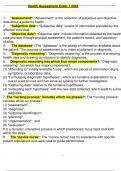Exam (elaborations)
Test bank physical examination & health assessment 9th edition by carolyn jarvis all chapters covered test bank 100% verified answers
- Institution
- California State University - Bakersfield
Test bank physical examination & health assessment 9th edition by carolyn jarvis all chapters covered test bank 100% verified answers
[Show more]



